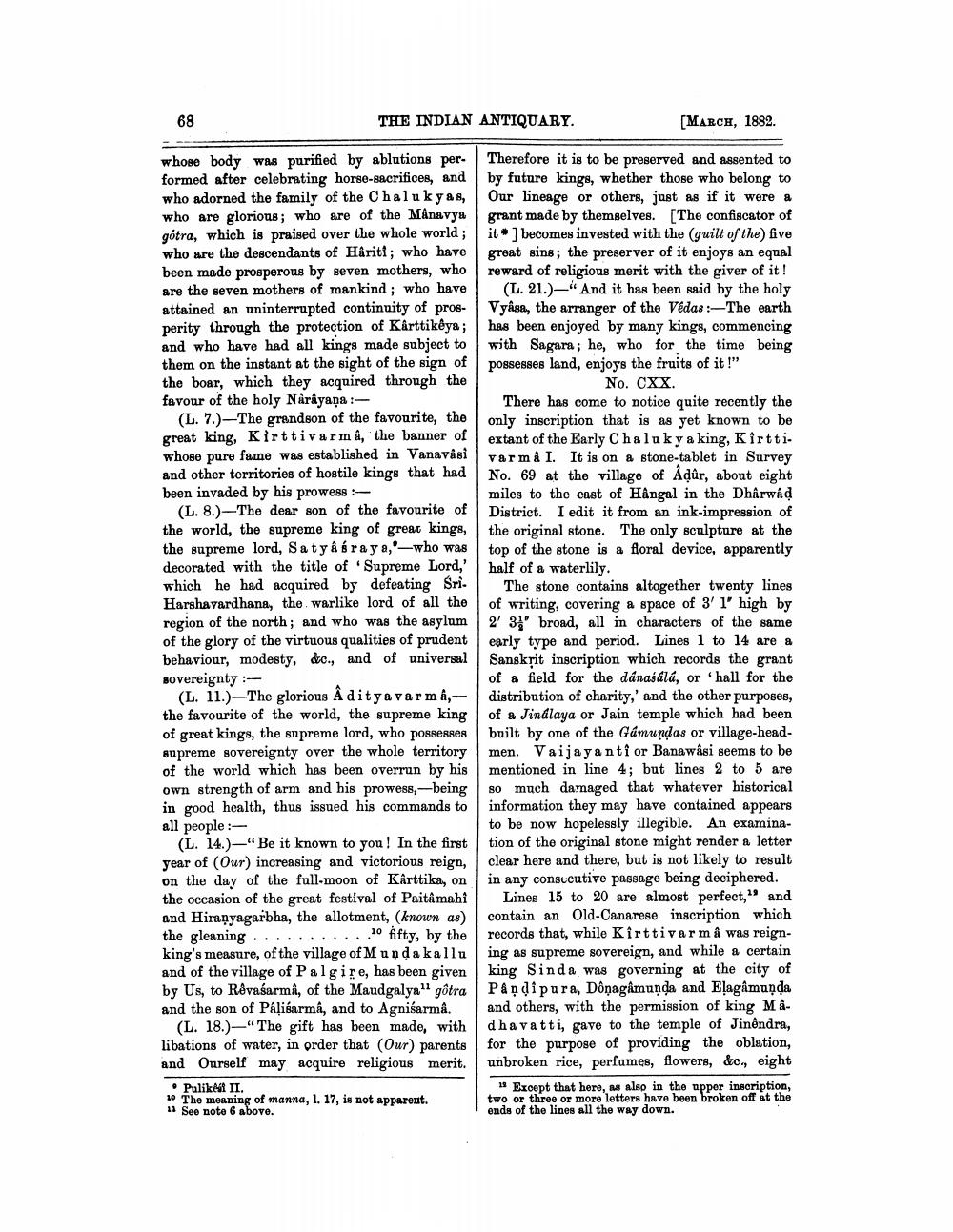________________
THE INDIAN ANTIQUARY.
[MARCH, 1882.
whose body was purified by ablutions per. formed after celebrating horse-sacrifices, and who adorned the family of the Chalukyas, who are glorious; who are of the Mânavya gótra, which is praised over the whole world; who are the descendants of Hâritf; who have been made prosperous by seven mothers, who are the seven mothers of mankind; who have attained an uninterrupted continuity of progperity through the protection of Karttikêya; and who have had all kings made subject to them on the instant at the sight of the sign of the boar, which they acquired through the favour of the holy Narayana :
(L. 7.)-The grandson of the favourite, the great king, Kirttivarma, the banner of whose pure fame was established in Vanavasi and other territories of hostile kings that had been invaded by his prowess :
(L. 8.)-The dear son of the favourite of the world, the supreme king of great kings, the supreme lord, Satyasraya, who was decorated with the title of Supreme Lord,' which he had acquired by defeating Sri. Harshavardhana, the warlike lord of all the region of the north; and who was the asylum of the glory of the virtuous qualities of prudent behaviour, modesty, &c., and of universal sovereignty :
(L. 11.)-The glorious Aditya varma,- the favourite of the world, the supreme king of great kings, the supreme lord, who possesses supreme sovereignty over the whole territory of the world which has been overrun by his own strength of arm and his prowess,-being in good health, thus issued his commands to all people :
(L. 14.)—“Be it known to you! In the first year of (Our) increasing and victorious reign, on the day of the full-moon of Kárttika, on the occasion of the great festival of Paitamahi and Hiraṇyagarbha, the allotment, (known as) the gleaning ...........10 fifty, by the king's measure, of the village of Munda kallu and of the village of Palgire, has been given by Us, to Rêvašarma, of the Maudgalya" gôtra and the son of PAliśarma, and to Agnisarma.
(L. 18.)-“The gift has been made, with libations of water, in order that (Our) parents and Ourself may acquire religious merit.
Therefore it is to be preserved and assented to by future kings, whether those who belong to Our lineage or others, just as if it were a grant made by themselves. [The confiscator of it ] becomes invested with the guilt of the) five great sins; the preserver of it enjoys an equal reward of religious merit with the giver of it!
(L. 21.)—"And it has been said by the holy Vyása, the arranger of the Vedas : The earth has been enjoyed by many kings, commencing with Sagara; he, who for the time being possesses land, enjoys the fruits of it!"
No. cxx. There has come to notice quite recently the only inscription that is as yet known to be extant of the Early Chalukya king, Kirtti. varm I. It is on & stone-tablet in Survey No. 69 at the village of Adûr, about eight miles to the east of Hângal in the Dharwad District. I edit it from an ink-impression of the original stone. The only sculpture at the top of the stone is a floral device, apparently half of a waterlily.
The stone contains altogether twenty lines of writing, covering a space of 3' l' high by 2' 3'' broad, all in characters of the same early type and period. Lines 1 to 14 are a Sanskrit inscription which records the grant of a field for the dánasklá, or 'hall for the distribution of charity,' and the other purposes, of a Jindlaya or Jain temple which had been built by one of the Gámundas or village-headmen. Vaijayanti or Banawasi seems to be mentioned in line 4; but lines 2 to 5 are so much damaged that whatever historical information they may have contained appears to be now hopelessly illegible. An examination of the original stone might render a letter clear here and there, but is not likely to result in any consucutive passage being deciphered.
Lines 15 to 20 are almost perfect, and contain an Old-Canarese inscription which records that, while Kirttivarm & was reigning as supreme sovereign, and while a certain king Sinda was governing at the city of Pandipura, DÔnagkmunda and Elagámunda and others, with the permission of king MAdhavatti, gave to the temple of Jinêndra, for the purpose of providing the oblation, unbroken rice, perfumes, flowers, &c, eight
Except that here, as also in the upper inscription, two or three or more letters have been broken off at the ends of the lines all the way down.
• Pulike II. 10 The meaning of manna, 1. 17, is not apparent. 11 See note 6 above.




